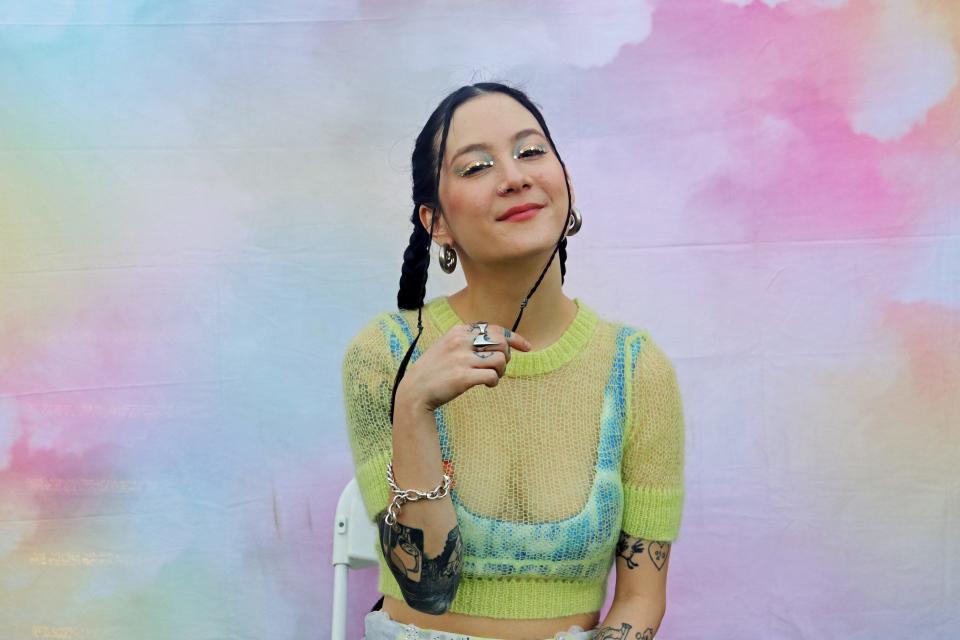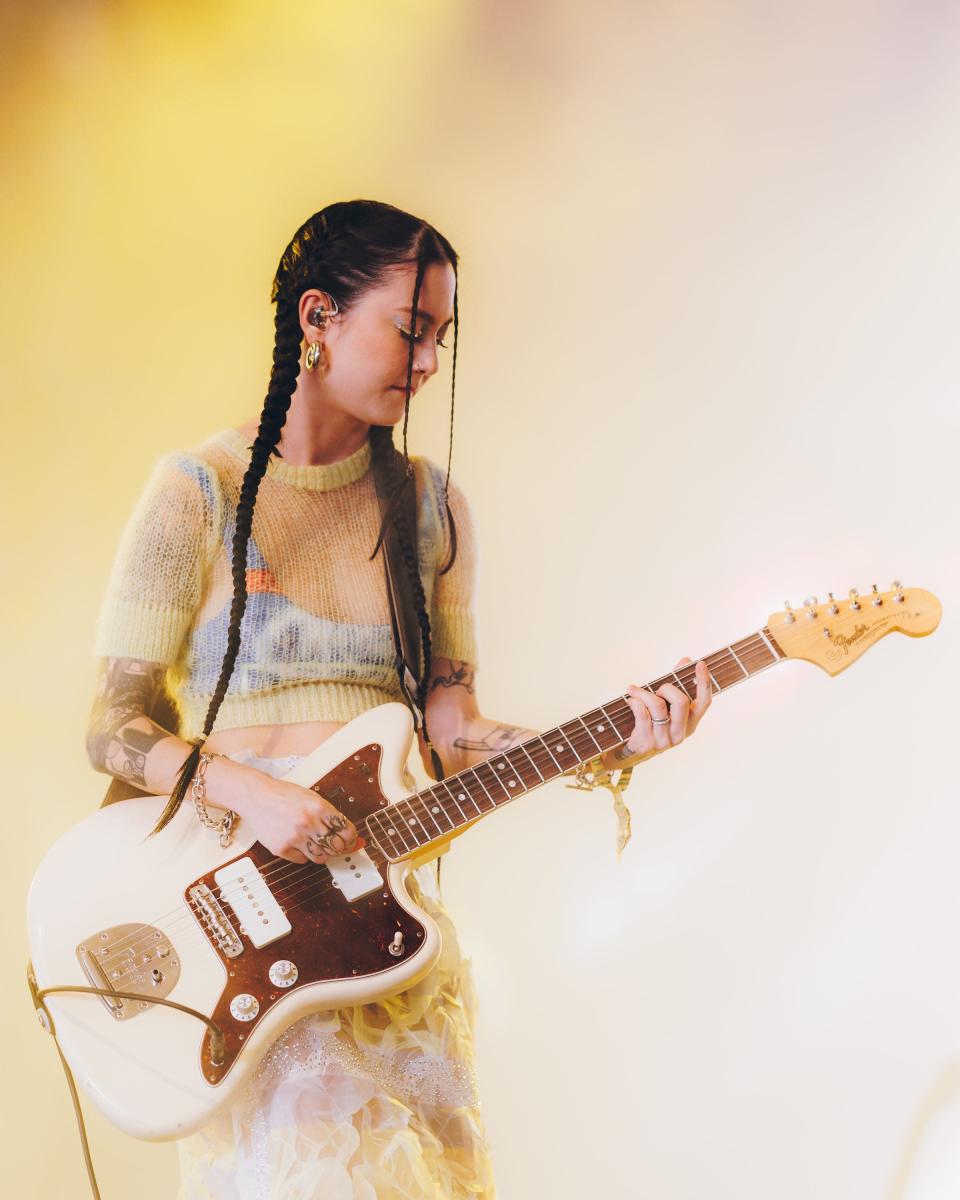Japanese Breakfast is too busy returning to Coachella and making ‘music for bottoms’ to care about your ‘basic’ fashion sense
8 min read
-
Japanese Breakfast took the stage at Coachella last weekend and will return on Saturday.
-
Singer-songwriter Michelle Zauner spoke to Insider about their joyful performance.
-
She also gave her thoughts on being nominated at the 2022 Grammys and sexism at music festivals.
On Saturday, if you’re lucky, you can find Michelle Zauner in the middle of the desert, smashing a gong and crooning about magic.
The celebrated songwriter and memoirist, who makes music under the name Japanese Breakfast, took the Mojave stage at Coachella last weekend and will soon return for round two.
During an interview with Insider backstage at the festival, Zauner oozed an honest kind of sweetness — fitting, since the fan-favorite track on her latest album “Jubilee” sees her beseeching a lover to return the favor. “Be sweet to me baby, I wanna believe in you,” she sings.
“Be Sweet” embodies the fantastical energy of “Jubilee,” Japanese Breakfast’s third album, which landed at No. 16 on Insider’s list of 2021’s best albums and earned Zauner a Grammy nomination for best alternative music album.
Although Japanese Breakfast undoubtedly flows from Zauner’s open heart, she’s hesitant to call the title an alter-ego or a personal stage name.
“I feel like it is a project that I direct,” she explained. “But it’s definitely something that would not be what it is without the collaborators that are involved.”
“I’ve just been with this band for a long time and it feels unfair to call it a solo project,” she continued. “I would never be in the position that I am without my team and bandmates.”
Zauner opened up to Insider about her joyful performance style, putting together a Dua Lipa-inspired stage look, and, yes, all those comments about her Grammys dress.

I’m very curious as to how you go about creating a setlist.
I really love festival slots because they’re shorter sets, so there’s less of a change of mood. It’s all bangers, all the shiny stuff, all the time.
We usually start with “Paprika” because it opens the new album, and it’s such a thesis statement for the record. It’s a song that’s very much about being in love with music and sharing it with the world.
We usually end with “Diving Woman” because it is the longest, loudest song that just builds and builds and builds. So those are usually our bookends, and then the rest are just the songs that we feel are going to have the best response.
When you wrote “Paprika,” did you know immediately it was going to be the “Jubilee” album opener?
I didn’t, no. I don’t think so. I feel like I was pretty self-conscious of that song, and that song had so many layers, but as soon as it started really coming together, it became clear that was the thesis of the album.
Self-conscious in what way?
I don’t know. I was self-conscious about everything, you know?
I was just a little bit intimidated because I had started writing horn and string arrangements by myself for the first time before bringing it to Craig Hendrix, our producer and drummer. So, yeah, I think I was just a little bit intimidated if I was doing it right.
Tell me about the transition from “Paprika” into “Be Sweet,” which happens on the tracklist as well as your setlist.
Why did I do that? I don’t know. It felt like a good vibe.
I guess I knew it was very much a one-two punch with “Paprika” and “Be Sweet,” and I always front-load my albums, to be honest. I always put what I think are the best songs in the beginning. Even typically when I make a playlist for friends and stuff like that, I always front-load and then chill it down over the course of the playlist or whatever.
Are you the type of person that makes hyper-specific playlists?
I do like to do that, yeah. I have a playlist of just women’s names. And I’ve been playing around with the idea of making a litanies playlist, so songs that just list things, like “We Didn’t Start the Fire” and The 1975’s “Love It If We Made It.”
When you perform, do you have any specific ideas for which colors and lights should go with which songs?
I feel like “Be Sweet” is very pink and blue. But most of the colors and the lights
were all done by Kat Borderud, our lighting designer. She’ll talk to me about the color palettes of certain songs, but she’s generally spot-on.
I think of you as a visual-minded artist, especially because of “Sable,” your video game soundtrack. What inspired you to sign onto a project like that?
It’s really lovely that you say that you associate me with visual arts, but I feel like beyond directing videos, I’m not really a visual artist. But I love the art for “Sable” so much.
Greg, who’s the creative director on that project, is such a stunning creative director and artist. I saw GIFs of the projects really early on, from 2017, and I trusted them as collaborators. I felt like they had a really great work ethic and vision.
I also really wanted to be a part of a creative project where I wasn’t the director, because I never get to do that anymore, and so I really enjoyed the process of just being a smaller cog in a larger creative machine. It was really a fun project for me.
If “Jubilee” were the soundtrack for a film, what genre do you think it would be?
I don’t know! I feel like a coming-of-age story.
Speaking of visual art, how do you put together a stage look?
Cece Liu is my stylist, and we’ve been working together since 2018. I was actually looking at my Coachella outfits from 2018, and I was like, “Oh my God, thank God I have a stylist now,” so I think it was after that when I was like, “I really need to have someone help me.”
She has really opened me up to fashion, and I tend to like to wear something colorful — and especially for summer festivals, something kinda slutty. [Laughs.] But something that’s easy to perform in and feels young and light and colorful.

What about your makeup? I notice you’re rocking some jewels today.
Yeah! That was my idea. I saw a photo of Dua Lipa, and I was like, “Can we do this?”
I also noticed today that your audience was very considerate, especially for a festival crowd.
A lot of times, when our tour managers have security meetings at venues, they’re always like, “Don’t worry. You’ll be really bored tonight. There’s nothing.” They’re very sweet and polite.
Do you think that’s a testament to the type of music you make?
My friend calls us “music for bottoms.” [Laughs.] I don’t know. I mean, we just make sensitive, emotional music so it attracts a certain type of person. I’m a very earnest person, and I think a lot of our fans are very earnest as well.
Meanwhile, some of your song titles are quite bold, like “Savage Good Boy” or “Road Head.” Do you consider that juxtaposition when you’re naming a track?
A lot of my titles and lyrics are always a little cheeky. A lot of times, lyrics get lost in the sonics of a song, and so that is an easy way to get people to perk up and pay attention to what the song is about.
Festivals, including Coachella, have been criticized in the past for undervaluing non-male artists, especially when it comes to booking headliners. As a female songwriter and frontwoman, do you think that’s a fair criticism?
I’m sure it’s a fair criticism. I was here for Beychella, and I’m here for Billie. I think that, across all festivals and the music industry in general, it’s something that is constantly changing and adapting and fairly criticized.
People have responded and been more cognizant of that when they put together a lineup, and so it seems to be changing, to me. I mean, I feel invited, so I feel like that’s a good thing.
On the topic of big music events, I have to ask you about the Grammys. Were you surprised to get a best new artist nomination this year, given that you’ve been around for a while?
I was not upset by it, you know what I mean? I was very surprised that we were nominated for any Grammys.
I was just delighted, and then when everyone was like, “She’s not a new artist,” I was like, “Shut up. Everyone just be quiet. Let’s just roll with this.” Because the opportunity to be nominated in a major category and get to actually sit in the main ceremony was such a privilege that I don’t know if I’m ever going to have again.
Definitely no complaints about being recognized as a “new artist.” For some people, it takes a really long time to get big enough to be recognized. We are not all fresh out the gate — as if the first time I play a guitar, I would make a record that gets me to the Grammys.
Sometimes it takes a little bit more time to get recognized at that level, and so I thought it was fair, and I was happy to be there.

How did you pick your dress for the ceremony?
I knew I want
ed to wear yellow. Yellow is a big color for our album, “Jubilee.” I wear a yellow dress on the cover, and all of our visuals are very yellow because that’s such a joyful color, and that was sort of what “Jubilee” represented.
I saw this Valentino couture look, and I thought it was simultaneously very chic but also kind of weird and cute and bright freaking yellow. It just seemed like the perfect dress. I kind of knew going in that that’s what I wanted, and I tried on a few other dresses, but it was hands-down my favorite.
Did you intend for the texture to mimic the “Jubilee” album cover?
Totally. Yeah. I feel like it looks like petals of flowers, but some people were like, “It looks like chips.” I was like, “You guys are just hungry. What the hell is wrong with you?” [Laughs.] They thought I looked like spilled Lay’s.
Usually, I’m pretty good about seeing what people might say about something, but I was like, “I just look like a big flower,” so I was surprised.
But that’s fine. I feel like it’s good to be divisive in fashion. I feel like they were just basic people.
This interview has been condensed and edited for clarity.
Listen to Japanese Breakfast and more on Spotify with Insider’s rising artist radio. Follow along with Insider’s Coachella coverage here.
Read the original article on Insider






